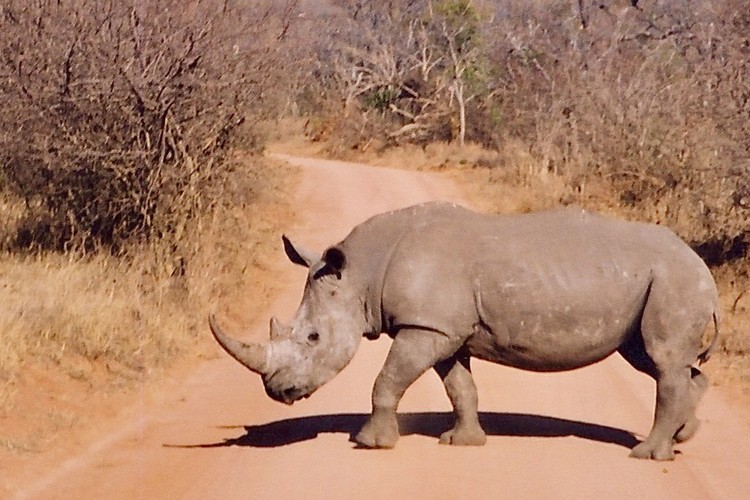Four more years in prison for rhino poacher
Mfana Ignitus Kubai’s prison sentence was increased from 11 to 15 years on appeal
An appeal court has increased the sentence of a man convicted of rhino poaching from 11 to 15 years. Photo: Brent Meersman
- An appeal court has increased the sentence of a man convicted of rhino poaching from 11 to 15 years.
- The initial sentence was far too lenient and not in line with the Limpopo Environmental Management Act, said the judge.
- Poacher Mfana Kubai was “found with his hands in the cookie jar” with two rhino horns, a rifle and a silencer.
- Judge Phatudi said prison sentences needed to show “just retribution” for the crime and act as a deterrent.
An appeal court has increased the prison sentence of a rhino poacher from 11 to 15 years.
Limpopo Judge Legodi Phatudi, with Judge Thogomelani Tshidada concurring, said the initial sentence given to Mfana Ignitus Kubai in the Louis Trichardt regional court in 2016 was lenient and shockingly inappropriate.
This was especially so since the province had one of the highest number of poaching incidents and rhinos are on the verge of extinction.
Judge Phatudi said Kubai had committed an offence which infringed the rights of all South Africans to have the environment protected.
“This pandemic is committed out of greed – to get rich quick,” the judge said.
Kubai, in his appeal, had argued that his sentence was too high. He said the trial court had not taken into consideration that he was a first offender and a breadwinner and had spent two years in custody awaiting trial.
However, the appeal judges indicated at the outset that the sentence imposed had not been in accordance with the Limpopo Environmental Management Act (LEMA) which prescribed a maximum term of 15 years.
Because of this, they were “bound to interfere” with the sentence and consider the evidence afresh.
Kubai, dressed in camouflage, was arrested in June 2014 at Chataronga in the far north of Limpopo, after a carcass of a recently killed rhino was found with two horns missing.
He was found in possession of a rifle, a silencer in a lunch box and two rhino horns in a black refuse bag – “caught with his hands in the cookie jar”, the judge said.
At the initial trial, Isak Prinsloo, manager at Chataronga game farm, said it cost R200,000 a month for security to protect the 51 rhinos on the farm. He said the farm had lost 11 rhinos to poaching in four years.
A probation officer said the offence was committed out of greed. He said Kubai lived a lavish lifestyle and drove luxury cars. Members of the community wondered where he got the money to sustain his lifestyle.
In rebutting Kubai’s claim that he “knew nothing about rhino poaching”, there was evidence that Kubai had in 2008 been arrested for 11 incidents of rhino poaching but had not been prosecuted because he had assisted the police which led to the arrest of some Chinese nationals.
Judge Phatudi said Kubai was clearly knowledgeable on how to poach wild animals and had “found his niche in rhino poaching”.
“He went to Chataronga with the full intent to hunt. He had with him a rifle and a silencer.
“I am not persuaded to consider him as a fallen angel. And it is immaterial whether he is a first offender or not,” said the judge.
Judge Phatudi said society watched the type of sentences courts imposed in poaching matters and courts needed to show “just retribution” for the crime and act as a deterrent.
“I find it necessary to increase the sentence in order to bring to equilibrium the scales of justice relating to the offence and the interests of society, as opposed to (Kubai’s) personal circumstances.”
He said a sentence less than the prescribed maximum of 15 years in terms of LEMA, would be disproportionate because of Kubai’s involvement in rhino poaching in 2008, and because he viewed poaching as his “niche and a lucrative business opportunity”.
Judge Phatudi ordered that Kubai, who was on bail pending the outcome of the appeal, report to his local police station within three days (as from date of judgment on 27 January 2023).
He also directed that the judgment be sent to SANParks and the Green Law Foundation which were monitoring the case.
Support independent journalism
Donate using Payfast

Don't miss out on the latest news
We respect your privacy, and promise we won't spam you.
Next: Protesters block main road in Cape Town, demanding electricity
Previous: Murdered Khayelitsha woman’s family say justice system failed them
© 2023 GroundUp. This article is licensed under a Creative Commons Attribution-NoDerivatives 4.0 International License.
You may republish this article, so long as you credit the authors and GroundUp, and do not change the text. Please include a link back to the original article.
We put an invisible pixel in the article so that we can count traffic to republishers. All analytics tools are solely on our servers. We do not give our logs to any third party. Logs are deleted after two weeks. We do not use any IP address identifying information except to count regional traffic. We are solely interested in counting hits, not tracking users. If you republish, please do not delete the invisible pixel.

